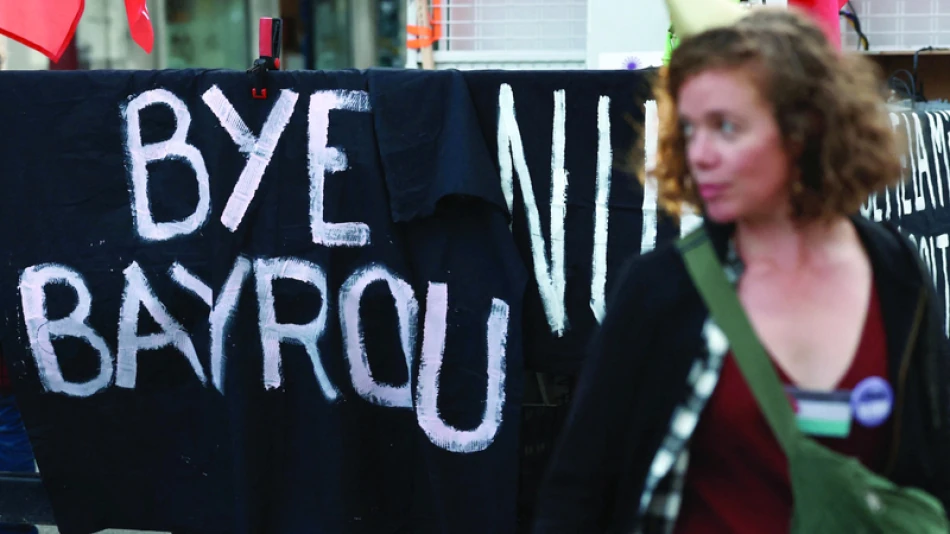
France Navigates Political Turmoil, Market Volatility, and Widespread Protests
France's Political Paralysis Deepens as Fourth Prime Minister Falls in Two Years
France has plunged deeper into political chaos after Parliament overwhelmingly rejected Prime Minister François Bayrou in a confidence vote, marking the country's fourth prime ministerial collapse in less than two years. With borrowing costs now exceeding Greece's and massive strikes looming, France faces a triple crisis of political uncertainty, market tension, and social unrest that could reshape European stability.
A Crushing Defeat That Surprised No One
Despite a passionate last-minute appeal to the National Assembly, Bayrou secured only 194 votes out of 558 in the confidence vote. The defeat was particularly humiliating given the breadth of opposition: far-left France Unbowed under Jean-Luc Mélenchon, Marine Le Pen's far-right National Rally, and even Socialists and center-right Republicans—some of whom had ministers in Bayrou's own government—voted against him.
The 74-year-old centrist had called the confidence vote himself, betting his political survival on €44 billion in budget savings planned for 2026 to reduce France's deficit from 5.4% of GDP. His gamble failed spectacularly, leaving President Emmanuel Macron with the unenviable task of finding a fifth prime minister who can navigate France's fractured Parliament.
The Fiscal Reality Behind the Political Theater
Bayrou's downfall reflects France's deeper structural problems. The country's debt burden has reached dangerous levels, with borrowing costs now higher than Greece's—a stunning reversal for Europe's second-largest economy. Credit rating agency Fitch is scheduled to update France's assessment on September 12, potentially triggering further market turbulence.
The prime minister's warnings that high public debt levels "endanger France's very life" fell on deaf ears. Socialist parliamentary leader Boris Vallaud blamed Macron for the political chaos, while Le Pen called the vote a "moment of truth" after "catastrophic results from five decades of waste."
Market Pressure Builds
French 10-year government bond yields have already risen close to Italy's levels—a concerning development for a country that has traditionally enjoyed premium borrowing terms. While France isn't struggling to find lenders yet, the trajectory suggests markets are losing patience with the political gridlock.
Some French observers believe it will take a full-blown market crisis for politicians and the public to truly understand what's at stake—echoing the sovereign debt crises that rocked peripheral eurozone countries in the early 2010s.
Macron's Shrinking Options
The French president now faces a menu of unpalatable choices, none likely to break the cycle of political deadlock. Constitutional law doesn't require him to call new elections, and he has little appetite for doing so after his June 2024 parliamentary dissolution backfired, leaving his party with even fewer seats.
The Le Pen Factor
Marine Le Pen certainly wants new elections. Her National Rally is already Parliament's largest party, and recent polling shows her alliance would win 33% in a first-round vote, compared to 25% for the left-wing coalition and just 15% for Macron's centrists. A remarkable 63% of French voters support returning to the ballot box.
Ironically, Le Pen herself cannot run for office, having been banned by a Paris court earlier this year in a party financing case. The prohibition remains in effect during her appeal, scheduled to begin in January 2026. If her party wins a majority, her 29-year-old protégé Jordan Bardella would become prime minister—potentially making him Europe's youngest head of government.
The Socialist Gambit
Some in Macron's camp argue for a deal with the Socialists, who hold 66 seats in the 577-member National Assembly. But the price would likely be accepting their plan for a new wealth tax—a minimum 2% annual levy on fortunes exceeding €100 million. Macron strongly opposes this, viewing it as undermining his business-friendly reforms that have attracted international investment to France.
Street Protests and Social Unrest Loom
Beyond parliamentary and market pressures, Macron's next prime minister will face an increasingly restive population. Labor unions have called for organized strikes on September 18, preceded by protests under the provocative slogan "Let's shut everything down."
These efforts, launched on social media like the Yellow Vest movement before them, have gained support from France's most radical unions. While protesting without a government in place may seem pointless, French street movements have a history of morphing into serious challenges—Macron ultimately retreated on fuel taxes to appease the Yellow Vests.
A Generational Reckoning
Perhaps most remarkably, Bayrou spent his final weeks in office arguing that France's social model is too biased toward post-World War II generations at the expense of younger citizens who will bear the debt burden. This demographic tension—with centrist politicians dependent on retiree votes while pursuing policies that burden the young—represents a deeper crisis in French democracy.
At 74, Bayrou became increasingly unpopular with younger voters who don't benefit from his policies. His willingness to challenge this generational imbalance, even as it sealed his political fate, may prove to be his most lasting contribution.
Europe Watches and Worries
France's political paralysis extends far beyond its borders. As a founding EU member and eurozone anchor, French instability threatens broader European cohesion at a time when the continent faces challenges from war in Ukraine to economic competition with China and the United States.
The contrast with other major economies is stark: while the U.S. navigates political transitions and Germany rebuilds its coalition government, France seems trapped in a cycle of governmental collapse that undermines long-term policy making.
Whoever Macron chooses as his next prime minister will inherit a country more turbulent than the one Bayrou left behind—and with even fewer tools to address France's mounting challenges. The question is no longer whether France can find political stability, but whether it can do so before market forces or social unrest force the issue.
Most Viewed News

 Sara Khaled
Sara Khaled






